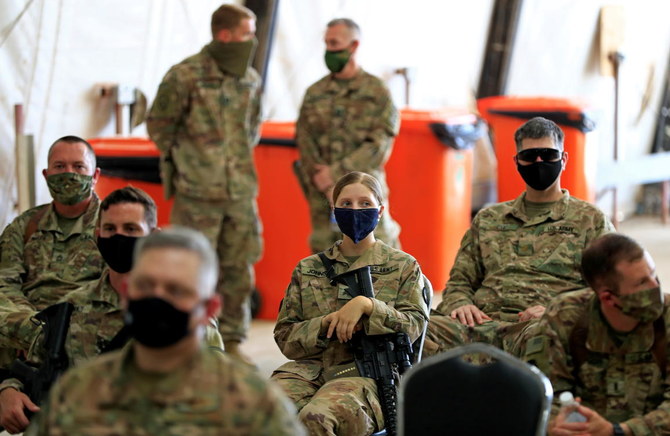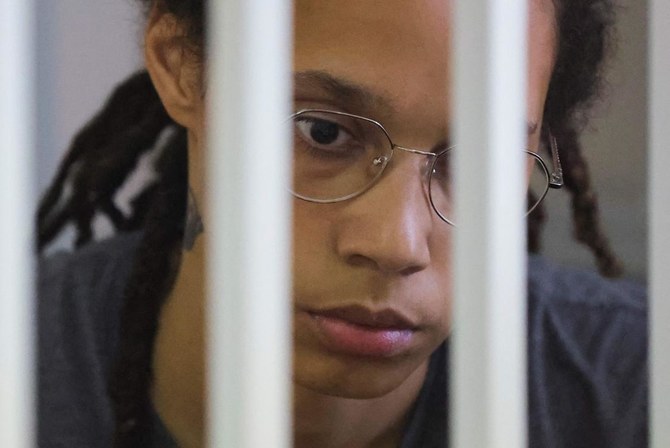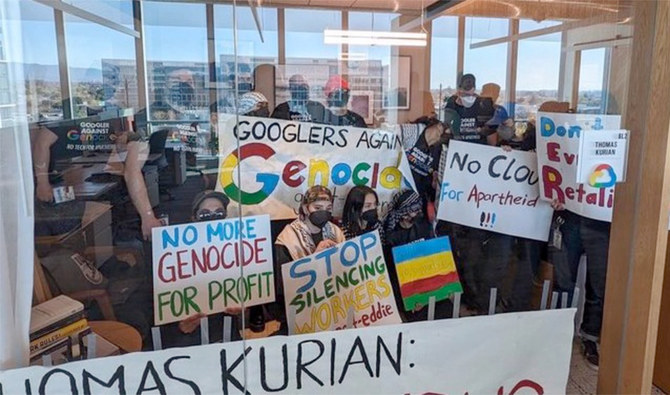BAGHDAD: A drone attack has been carried out on a military base in Iraqi Kurdistan that hosts American troops, without causing any casualties, the US-led coalition said Saturday.
The attack comes with Iraqi Prime Minister Mustafa Al-Kadhemi expected to meet US President Joe Biden in Washington on Monday to discuss a possible full US troop withdrawal from his country.
“An unmanned aerial system impacted a coalition base in Kurdistan” in the early hours of Friday, coalition spokesman US Col. Wayne Marotto said in a statement.
“There were no casualties and no damage as a result of the attack,” he said, adding “the United States and coalition forces will stay vigilant and maintain the inherent right to self-defense.”
Iraqi Kurdish media outlets said the attack targeted a base at Al-Harir, 70 kilometers (45 miles) northeast of Irbil, the capital of the autonomous Kurdistan region.
It was the latest in a spate of attacks on US military and diplomatic facilities in Iraq, blamed on pro-Iranian armed groups within a state-sponsored paramilitary force.
The United States still has around 2,500 troops deployed in Iraq, out of 3,500 men in the international coalition set up in 2014 to fight the Daesh group.
Their departure is demanded by the pro-Iranian factions, which have been blamed for some 50 attacks against US interests in Iraq since the beginning of the year.
The Iraqi Resistance Coordination Committee on Friday threatened to continue the attacks unless the US withdraws all its forces and ends the “occupation.”
Most of the American troops deployed in the coalition, which helped defeat Daesh in Iraq in 2017, were withdrawn under former US president Donald Trump.
Those that remain are officially classed as advisers and trainers for Iraq’s army and counter-terrorism units.
Drone attacks Iraq base hosting US troops: coalition
Drone attacks Iraq base hosting US troops: coalition

Al Ain knock out Al Hilal to reach Asian Champions League final

- Hernan Crespo’s Al Ain will face either Yokohama F-Marinos or Koreans Ulsan Hyundai in the final in May
RIYADH: Al Ain reached the Asian Champions League final for the first time since 2016 with a 5-4 aggregate victory over four-time winners Al Hilal, despite a 2-1 second-leg defeat in Riyadh on Tuesday.
Trailing 4-2 after their record 34-match winning run was ended in last week’s first leg, Al Hilal quickly cut the deficit through Ruben Neves’ fourth-minute penalty.
Brazilian Erik drew Al Ain level on the night, though, to leave runaway Saudi Pro League leaders Al Hilal with a mountain to climb in the second half.
But Salem Al Dawsari scored a rebound less than six minutes after the restart to give the hosts renewed hope.
Brazilian Michael and former Lazio star Sergei Milinkovic-Savic both went close as Al Hilal piled on the pressure, the latter seeing his effort cleared off the line.
Al Ain goalkeeper Khalid Eisa enjoyed a fine evening, making six saves, including from Michael and Mohamed Kanno late on.
The Emirati visitors clung on desperately through nine minutes of added time, with Eisa keeping out a Michael header in the 98th minute.
Hernan Crespo’s Al Ain will face either Yokohama F-Marinos or Koreans Ulsan Hyundai in the final in May as they bid for a second triumph in the competition and first since 2003.
Japanese club Yokohama trail 1-0 on aggregate heading into their semifinal second leg on Wednesday.
Griner contemplated suicide during Russian prison ordeal

- Griner made the revelation in excerpts of an upcoming interview with ABC Television released on Tuesday
- “Yeah, I just didn’t think I could get through what I needed to get through,” an emotional Griner said
LOS ANGELES: WNBA superstar Brittney Griner has revealed she contemplated suicide during her nine-month ordeal in a Russian jail that left her feeling “less than a human.”
Griner, who was detained in a Moscow airport in February 2022 on drug charges before being sentenced to nine years in prison, made the revelation in excerpts of an upcoming interview with ABC Television released on Tuesday.
“Yeah, I just didn’t think I could get through what I needed to get through,” an emotional Griner said when asked by her interviewer on ABC’s 20/20 news show if she had considered “ending it all.”
In other segments of the interview, Griner, who was freed in late 2022 as part of a prisoner swap, gave an insight into the grim conditions of her incarceration at a Russian penal colony.
“The mattress had a huge blood stain on it. I had no soap, no toilet paper. That was the moment where I just felt less than a human,” Griner said.
Griner said at one stage during her imprisonment she was ushered into a room to find “a huge knife sitting on the table.”
“And I was like ‘Now, this is going to be a ride,’” she said. “You’ve got to do what you got to do to survive.”
Griner was arrested and charged by Russian officials for possessing vape cartridges containing hashish oil in her luggage as she passed through airport security.
She later testified she had “no intention” of breaking the law and had packed the cartridges by accident.
Asked by ABC what she felt when she realized that she had left the cartridges in her luggage, she replied: “My life is over right here.”
Later in the interview, Griner recalls the moment she was handed her nine-year prison term.
“I was just so scared for everything because there’s so much unknown,” she said.
A two-time Olympic gold medalist, WNBA champion, Griner was eventually released in December 2022 as part of a deal that saw her swapped for notorious Russian arms dealer Viktor Bout — known as the “Merchant of Death.”
At the time, Griner was one of several US-based players playing in Russia during the WNBA off-season in order to boost her income.
She has vowed never to play basketball abroad again for clubs following her jail sentence.
Griner’s full interview, which comes ahead of the release next month of a memoir by the basketball player detailing her ordeal, will be aired on May 1.
What We Are Reading Today: Sixty Miles Upriver

Author: Richard E. Ocejo
Newburgh is a small postindustrial city of some 28,000 people located 60 miles north of New York City in the Hudson River Valley.
Like many similarly sized cities across America, it has been beset with poverty and crime after decades of decline, with few opportunities for its predominantly minority residents.
“Sixty Miles Upriver” tells the story of how Newburgh started gentrifying, describing what happens when White creative professionals seek out racially diverse and working-class communities and revealing how gentrification is increasingly happening outside large city centers in places where it unfolds in new ways.
Google fires at least 20 more workers who protested its $1.2bn contract with Israel

NEW YORK: Google fired at least 20 more workers in the aftermath of protests over technology the company is supplying the Israeli government amid the Gaza war, bringing the total number of terminated staff to more than 50, a group representing the workers said.
It’s the latest sign of internal turmoil at the tech giant centered on “Project Nimbus,” a $1.2 billion contract signed in 2021 for Google and Amazon to provide the Israeli government with cloud computing and artificial intelligence services.
Workers held sit-in protests last week at Google offices in New York and Sunnyvale, California. The company responded by calling the police, who made arrests.
The group organizing the protests, No Tech For Apartheid, said the company fired 30 workers last week — higher than the initial 28 they had announced.
Then, on Tuesday night, Google fired “over 20” more staffers, “including non-participating bystanders during last week’s protests,” said Jane Chung, a spokeswoman for No Tech For Apartheid, without providing a more specific number.
“Google’s aims are clear: the corporation is attempting to quash dissent, silence its workers, and reassert its power over them,” Chung said in a press release. “In its attempts to do so, Google has decided to unceremoniously, and without due process, upend the livelihoods of over 50 of its own workers.”
Google said it fired the additional workers after its investigation gathered details from coworkers who were “physically disrupted” and it identified employees who used masks and didn’t carry their staff badges to hide their identities. It didn’t specify how many were fired.
The company disputed the group’s claims, saying that it carefully confirmed that “every single one of those whose employment was terminated was personally and definitively involved in disruptive activity inside our buildings.”
The Mountain View, California, company had previously signaled that more people could be fired, with CEO Sundar Pichai indicati ng in a blog post that employees would be on a short leash as the company intensifies its efforts to improve its AI technology.
Israel army unit facing US sanctions has history of abuses

JERUSALEM: An Israeli battalion which US media say Washington is likely to sanction over alleged rights violations against Palestinians, has a long history of transgressions and impunity, according to analysts and Israeli media.
The military’s Netzah Yehuda unit was founded in 1999 to encourage ultra-Orthodox Jewish men to enlist but has since accepted other religious recruits including residents of Israeli settlements in the occupied West Bank, where Netzah Yehuda was deployed until 2022.
The unit has mainly attracted marginalized ultra-Orthodox youths “who see the army as a means of integrating into Israeli society and earning a living,” said David Khalfa of Jean-Jaures Foundation, a French think tank.
But it has also drawn “rather radical religious nationalists having strong hostility toward Arabs,” he said. “Marked by a strong ideological and sociological leaning, the battalion has acquired a scandal-prone reputation.”
Marwa Maziad, a visiting lecturer of Israel studies at the US University of Maryland, told the Middle East Eye website that unlike most army units, Netzah Yehuda relies on volunteers.
She said: “The battalion attracts religious Zionists, who combine Jewish religious interpretations with nationalist militarism” and are closely associated with the extreme fringes of the Israeli settler movement.
The West Bank, which Israel has occupied since 1967, is home to 3 million Palestinians alongside some 490,000 Israelis living in settlements considered illegal under international law.
“A large part of the unit’s soldiers were born and raised in the West Bank,” Khalfa said, noting Netzah Yehuda was often tasked with policing and “counter-insurgency” operations in the Palestinian territory.
“A significant number of them — not all — committed abuses and the army hardly imposed any sanctions,” Khalfa said.
The January 2022 death of Palestinian American Omar Assad, 78, at the hands of Netzah Yehuda soldiers in the West Bank drew attention to the unit, with the US State Department later that year ordering embassy staff in Israel to investigate the case.
Handcuffed, gagged and blindfolded, Assad was left lying on the ground on his stomach for more than an hour in a freezing winter night.
Following Assad’s death, several Israeli media outlets published reports detailing incidents linked to the battalion that had gone largely unpunished, including beatings of Palestinians and attacks on Bedouin citizens of Israel.
The Jerusalem Post newspaper said Netzah Yehuda troops effectively allowed settlers to attack Palestinians, while Haaretz, a left-leaning daily, denounced the “clear ideological connection between the residents of the settlements and the unauthorized outposts and the soldiers” in the unit.
According to Khalfa, “within the army there are lively debates” over Netzah Yehuda, with some military officials considering it “dangerous for the army to bring together so many young people sharing the same nationalist ideology.”




















